Do you often find yourself with a hot glue gun at the ready, about to dive into your next crafty project? It’s an easy tool to use but forgetting that it can be dangerous is too common. After all, not many of us think about the possibility of our glue gun overheating and potentially starting a fire if we don’t pay close attention. We are here today to discuss just that. Is it possible for a hot melt glue gun to unexpectedly generate sparks or ignite flames? And what safety precautions do we need to take when working with one so as not to run into these issues?
Glue Gun safety
Before diving into the nitty-gritty, it’s crucial to understand that while mishaps with glue guns are not frequent, they’re certainly possible if safety guidelines are overlooked. With the right precautions, though, you can ensure a safe and creative crafting experience.
Safety First
- First and foremost, always keep your workspace clean and well-lit. Clutter can lead to mishaps, and poor lighting can prevent you from seeing potential hazards.
- It is essential to disconnect your glue gun from the power source whenever it is not in use. This will prevent it from overheating and becoming a fire hazard. Never leave a plugged-in gun unattended, and remember to place it on a heat-resistant surface.
- Then, avoid touching the nozzle or the glue while the gun is on as they get extremely hot and can lead to severe burns.
- To ensure your safety, remember to wear heat-resistant gloves as a protective measure. Also, have a bowl of cold water readily available in case of any unintentional contact with the hot glue.
- Furthermore, it’s important to select the correct glue sticks to avoid any malfunctions that might arise from using the wrong size or type.
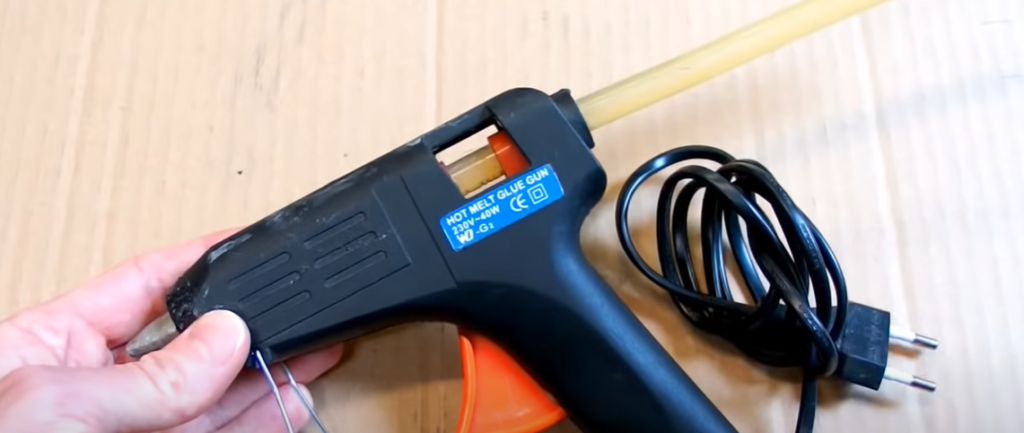
Table of Contents
When you’re working
- Maintain Concentration and Steady Pace: Maintaining concentration is vital when operating a hot melt glue gun. Diverting your attention, even briefly, could lead to potential accidents. Steadiness is key. [1] Too much pressure on the trigger could cause a surge of hot glue, leading to inadvertent contact with skin or surfaces.
- Regularly Check the Cord and Plug: Ensure that you routinely examine the cord and plug of your gun to identify any potential issues. Any faults in these could lead to electrical hazards, so replace the glue gun immediately if any damages are noted.
3.Ventilation is Key: Ensure your workspace is well-ventilated. Despite being non-toxic, hot glue can emit fumes when heated. Constant inhalation of these fumes could lead to mild headaches or respiratory discomfort. A well-ventilated room will disperse these fumes, keeping you safer.
Children and glue guns
- Supervision is Essential: It is of utmost importance to provide constant supervision when kids are operating glue guns. Crafting is an excellent way for children to nurture creativity and motor skills, but the associated risk should not be underestimated. Under no circumstances should children be left unsupervised while using a hot glue gun.
- Opt for low-temperature glue guns when crafting with children to minimize the risk of severe burns. These glue guns operate at lower temperatures, ensuring a safer crafting experience. However, even though they’re less dangerous, it’s still important to monitor their usage closely. [2]
- Educate About Safety: Teach children about the potential dangers and the importance of safety precautions when using a hot glue gun. They need to understand that it’s not a toy and should be handled with care. It’s essential to instill these lessons early to ensure they can enjoy crafting safely.
- Create a Safe Workspace: Setting up a safe workspace is just as important when children are involved in crafting. Make sure the area is well-lit and free of clutter. Keep a bowl of cold water handy and ensure children are wearing heat-resistant gloves for protection.
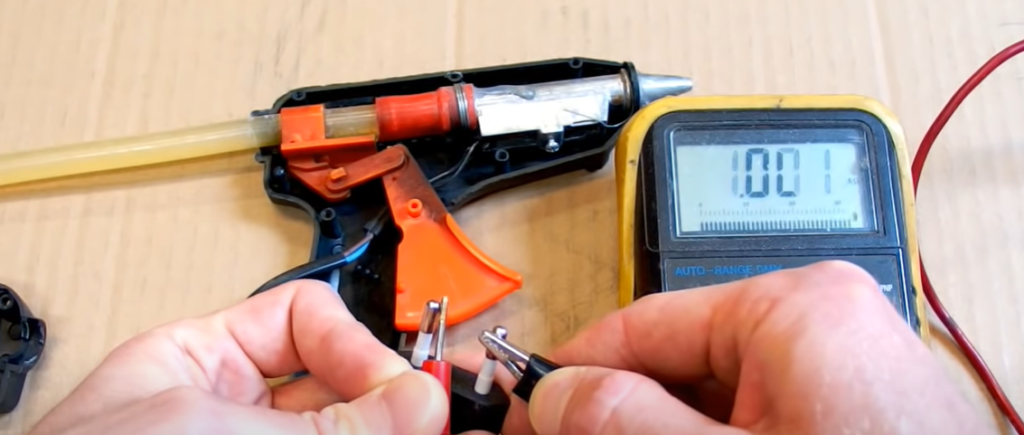
When you’re finished
- Proper Cleaning & Maintenance: Once you have completed your crafting session, it is essential to properly clean and maintain your hot glue gun. Even though it’s a simple tool, a well-maintained glue gun will serve you for a longer period and reduce the risk of malfunction.
- Allow the Glue Gun to Cool: Always allow the glue gun to cool completely before you start cleaning. This not only ensures your safety but also prevents the risk of the gun being damaged in the cleaning process.
- Remove Glue Sticks from the Gun: In order to extend the lifespan of your hot glue gun, it is advisable to remove the glue stick from the gun when you do not plan to use it for a while. This helps to prevent the glue from hardening inside the gun, which can lead to clogging.
- Wipe the Nozzle: Gently clean the hot glue gun’s nozzle using a damp cloth or sponge. Avoid using sharp or abrasive tools as they can damage the nozzle. Removing the hardened glue will ensure a smooth flow of glue the next time you use it.
- Check and Clean the Trigger and Handle: The trigger and handle of the glue gun are used frequently and can get sticky due to the glue residue. Check and wipe these parts with a damp cloth. Maintaining them clean ensures comfortable use and proper functioning of the trigger.
- Store in a Safe Place: Finally, always store your hot glue gun in a safe, dry place. Avoid placing it in areas with high humidity as this can cause the internal parts to rust over time. Make sure that it is kept out of reach of children and pets. [3]
Can a glue gun start a fire?
Yes, a hot glue gun can potentially start a fire if not used and handled correctly. This is primarily due to the heating element inside the gun which melts the glue sticks. If left switched on or unattended for extended periods, the glue gun can overheat, leading to a fire hazard. Moreover, a faulty or damaged cord can also pose a significant risk. Therefore, it’s crucial to always unplug the glue gun after use, never leave it unattended whilst it’s on, and regularly check the cord for any signs of damage or wear.
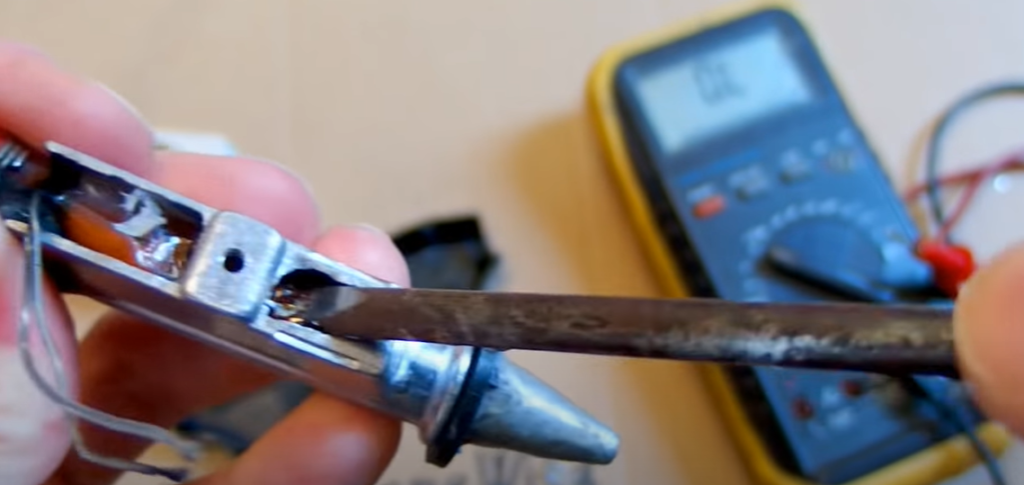
In case of a burn
In the event of a burn caused by a hot glue gun, it’s crucial to handle the tool correctly to prevent further accidents. First, ensure the glue gun is unplugged to avoid any more harm or potential fire hazards. Then, place it safely on a heat-resistant surface, making sure the hot nozzle is not in contact with any flammable materials. Never attempt to handle or clean the glue gun immediately after a burn incident; allow it to cool down completely before doing so.
Despite taking all the safety measures, accidents can happen.
First Aid Steps for Burns:
Step 1: Cool the Burn
Immediately cool the burn area with cool (not cold) running water for about 10 to 15 minutes. This will help to reduce swelling and soothe the pain.
Step 2: Apply a Cool Compress
If running water isn’t available, use a cool compress or a cold, damp cloth instead. Do not apply ice as it can damage the skin tissue further.
Step 3: Cover the Burn
Cover the burn with a sterile, non-stick bandage or dressing to protect the damaged skin and reduce the risk of infection. Avoid using fluffy cotton or fabrics that can stick to the burn.
Step 4: Take Over-the-Counter Painkillers
If the pain persists, over-the-counter painkillers like ibuprofen or acetaminophen can be used. Always follow the instructions provided on the packaging.
Step 5: Seek Medical Help
If the burn is severe or covers a large area, or if there are signs of infection (such as increased pain, redness, fever, swelling, or oozing), seek immediate medical attention.
Additional hazards
1. Carbon Monoxide Poisoning
Hot glue guns don’t emit large amounts of carbon monoxide, but they can still pose a minor risk, particularly in poorly ventilated environments. Carbon monoxide is an invisible, odorless gas that, when inhaled at high levels, can lead to headaches, dizziness, nausea, and even loss of consciousness. [4] Insufficient ventilation can lead to the accumulation of this gas, heightening the likelihood of carbon monoxide poisoning.
2.Electrical Burns
The process of melting glue sticks is facilitated by an electrical heating element. If the device is faulty or mishandled, it can result in electrical burns. These burns are known as electrical burns, which result from an electric current passing through the body and causing tissue damage. They can be more hazardous than thermal burns because they may affect internal tissues while leaving minor or no visible signs on the skin. Symptoms of an electrical burn include skin burns, numbness, weakness, muscle contractions, and in severe cases, irregular heartbeat or breathing difficulties. Don’t use the device near water or with wet hands, and always unplug the device when not in use.
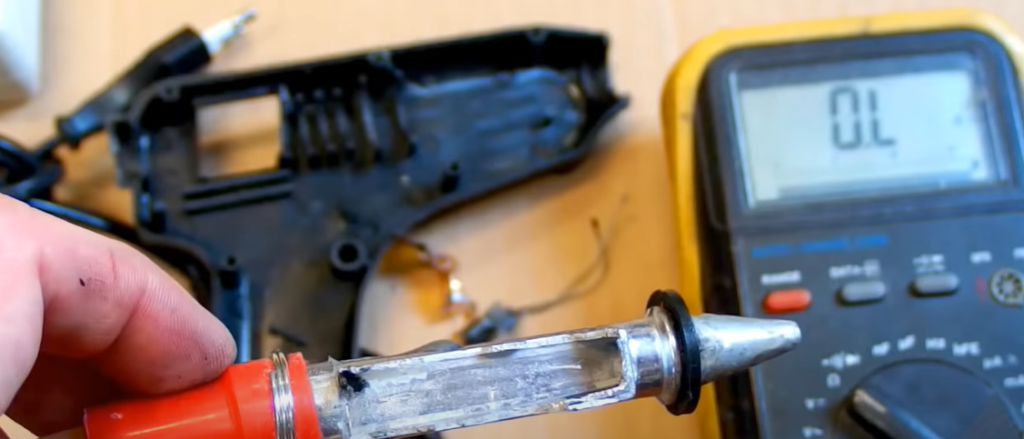
3. Ocular and respiratory injuries
When using hot melt glue guns, the possibility of eye injuries or breathing complications should not be overlooked. Hot glue can splatter, and if it gets into your eyes, it can cause serious harm, including burns or temporary or permanent vision loss. Additionally, the fumes expelled by the glue gun may be hazardous, particularly if the tool is used for extended periods in a poorly ventilated area. Prolonged inhalation of these fumes can lead to respiratory issues, such as coughing, wheezing, shortness of breath, and even asthma exacerbation. To mitigate these risks, permanently wear protective glasses when operating a hot melt glue gun to protect your eyes from potential splatters.
4. Explosion
While extremely rare, there is a minimal risk that a glue gun can explode if it is improperly used or defective. This could occur if the heating element overheats or if there’s a short in the electrical wiring. The explosion can also cause flying debris that can result in injuries. To reduce this risk, always avoid leaving a gun unattended while it is plugged in, and remember to turn off and unplug the device after each use. If the gun begins to smoke or make unusual noises, turn it off, unplug it, and let it cool down. Do not attempt to use it again until it’s been thoroughly checked and deemed safe.
Are the glue sticks used in hot glue guns toxic?
Sticks themselves are generally considered non-toxic, and the adhesive substance within them is safe once it has cooled and hardened. [5] However, one should be cautious when the glue is hot and in liquid form, as it can cause burns. Moreover, it’s essential to avoid ingesting glue sticks or inhaling the fumes they produce when melted, as this can be harmful. Always ensure good ventilation when using the glue gun, and keep the glue sticks out of reach of children and pets. If ingested or if there’s prolonged exposure to the fumes, seek medical attention immediately.
Frequently Asked Questions
Can a hot glue gun overheat?
Yes, a hot glue gun can overheat if left on for too long. Overheating can cause the glue to degrade, make the gun less effective, and at times, even lead to potential fire hazards or the gun exploding. Therefore, it’s crucial to always monitor the glue gun when in use, and avoid leaving it plugged in and unattended.
Is it normal for a hot glue gun to smoke?
While it’s not uncommon for a hot glue gun to emit a small amount of smoke when heating up, consistent or heavy smoking is not normal and could be an indication of a problem. The smoke may result from accumulated dust or debris on the heating element, overuse of the gun leading to overheating, or a potential malfunction with the device’s electrical components. In any case, if your hot glue gun is smoking, it’s advisable to turn it off, unplug it, and let it cool. If the smoking persists, consider seeking professional help or replacing the gun to avoid any risk of fire or other hazards.
What happens if you leave a hot glue gun plugged in for too long?
Leaving a hot glue gun plugged in for too long can lead to overheating, potentially causing the glue to degrade and the gun to malfunction. In worst-case scenarios, it could pose a serious fire hazard or even cause the gun to explode. Furthermore, an overheated glue gun may not work effectively, and the excessive heat can damage the gun’s internal components, reducing its lifespan.
Can you leave a hot glue gun on all night?
No, it’s not recommended to leave a hot glue gun on all night. Doing so could lead to overheating, posing a significant fire hazard and potentially causing the gun to malfunction or even explode. Even if the gun has a built-in automatic shut-off feature, it’s still best practice to turn off and unplug the device when it’s not in use. Always prioritize safety by handling hot glue guns responsibly.
Is it bad to smell hot glue?
While the scent of hot glue may not be particularly harmful to most individuals, consistent or prolonged exposure to the fumes may cause discomfort or potential health issues, particularly in those with respiratory sensitivities. If you notice a strong, unpleasant smell while using a hot glue gun, it’s crucial to ensure that you’re working in a well-ventilated area to minimize exposure to the fumes. If you experience symptoms like headaches, dizziness, or difficulty breathing, it’s advisable to stop using the tool immediately, move to a fresh-air environment, and seek medical advice if symptoms persist.
Useful Video: Exploding Hot Melt Glue Gun
Conclusion
In conclusion, while hot glue guns are a convenient and versatile tool for numerous crafting and repair tasks, it’s vital to use them with care and caution. Being aware of the potential risks and taking the appropriate safety measures can mitigate hazards. This includes using safety glasses, ensuring proper ventilation, never leaving the device unattended while it’s plugged in, and regularly checking the tool for any signs of wear or damage. By treating the hot glue gun with respect, you can enjoy its benefits while minimizing any safety risks.
References:
- https://www.hotmelt.com/blogs/blog/10-essential-safety-precautions-to-take-when-working-with-hot-melt
- https://www.gluegun.com/blogs/news/7632387-glue-gun-safety
- https://www.gluegunsdirect.com/service-and-advice/glue-gun-safety-advice/
- https://www.mayoclinic.org/diseases-conditions/carbon-monoxide/symptoms-causes/syc-20370642
- https://www.gluemachinery.com/is-hot-glue-toxic/

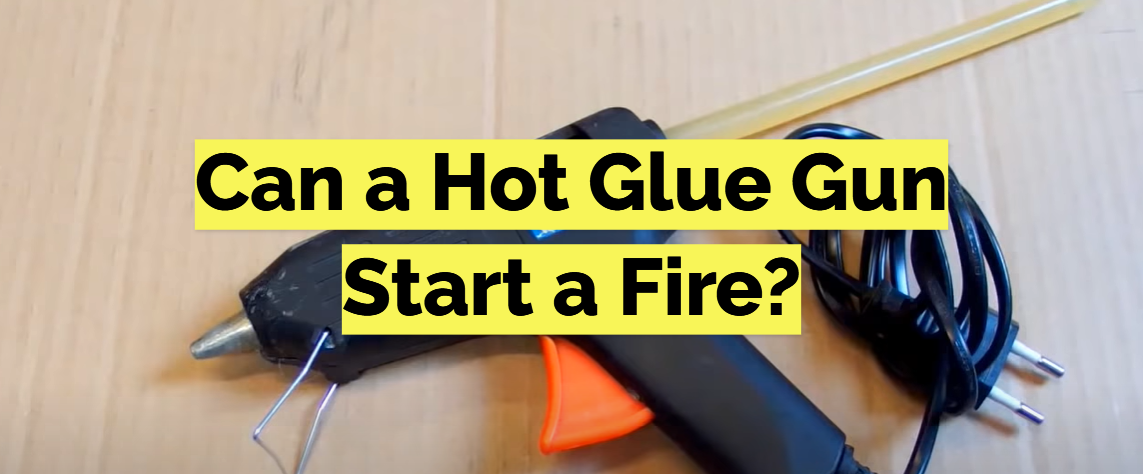
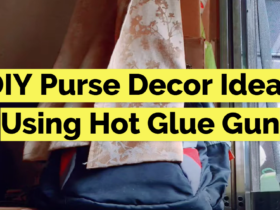

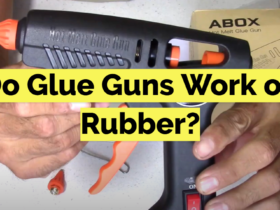

Leave a Reply